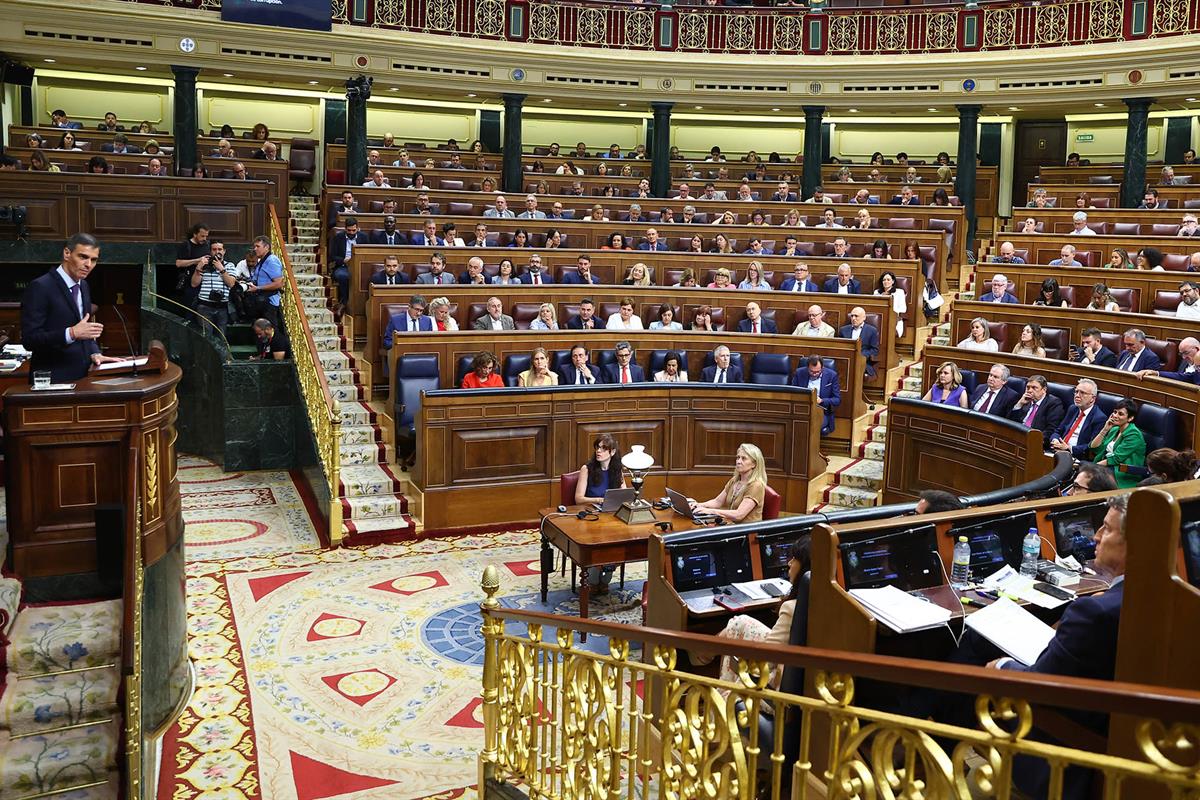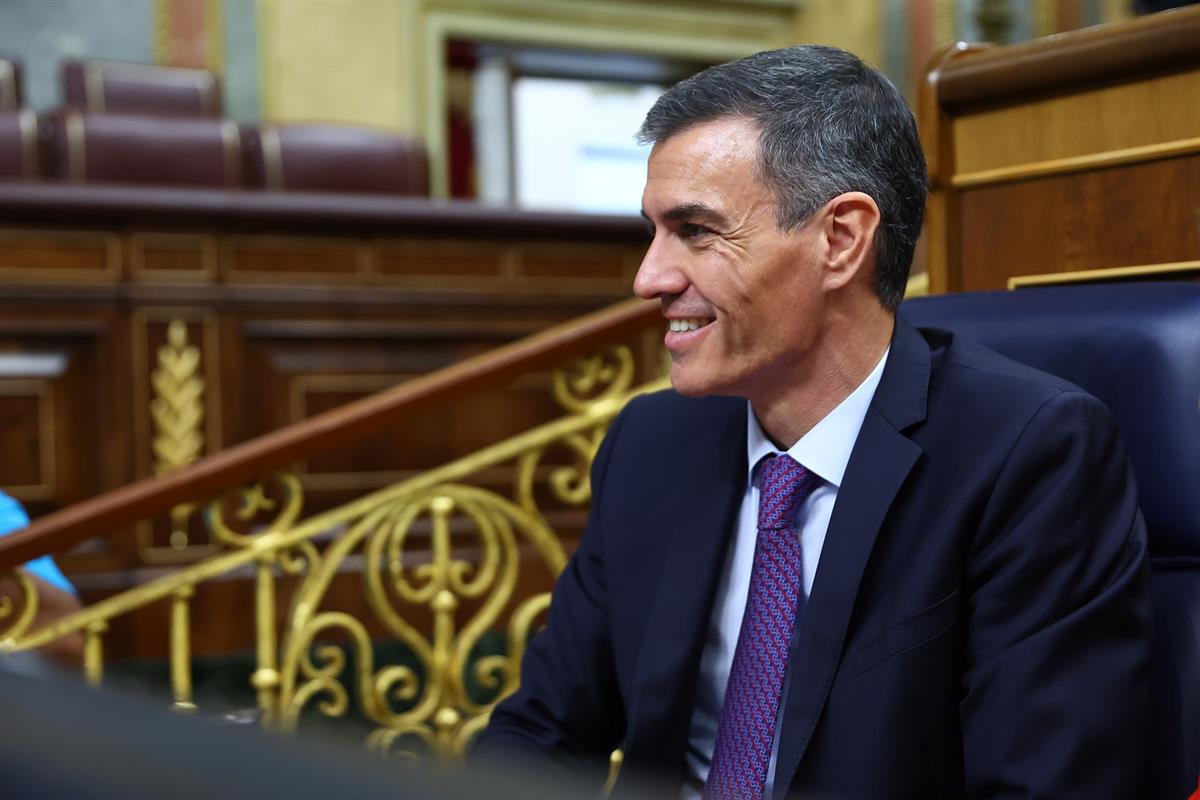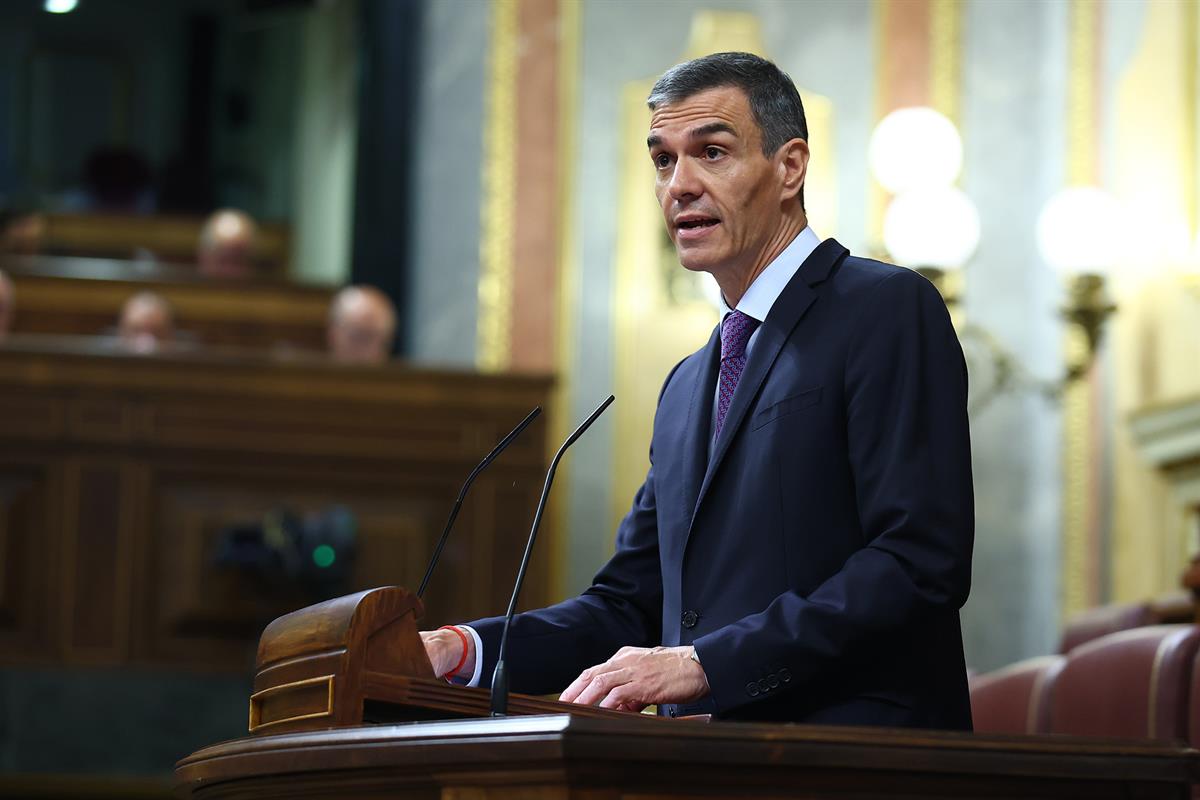Extraordinary session of the Plenary of the Lower House of Parliament
Pedro Sánchez defends international law and multilateralism to tackle global challenges
President's News - 2025.7.9
Lower House of Parliament, Madrid
 Pool Moncloa / Fernando Calvo
Pool Moncloa / Fernando Calvo
"Spain is not resigned" to the fact that the principles of cooperation, openness and solidarity that have guided international relations for decades are questioned or "directly violated" by some leaders. For this reason, he pointed out, the government defends the same position in all international meetings: firmness with Russia in Ukraine, commitment to Europe and defence of international law and multilateralism as the key tools for tackling "the great challenges of our time".
In his appearance to report on the NATO Summit in The Hague, the recent European Council and the 4th International Conference on Financing for Development, Pedro Sánchez also stressed that the government has been acting for years in response to changes in world security, as demonstrated by the logistical and technical support for Ukraine, the reinforcement of the Armed Forces and the State Security Forces and Corps, and participation in peace and protection missions. In addition, the Executive has launched a plan to develop Spain's infrastructure and technological and human capabilities to guarantee the country's protection and meet the commitment to invest 2% of GDP in defence, made in 2014.
Defence investment: real needs and European coordination
The President of the Government of Spain detailed the reasons for the refusal to raise this percentage of expenditure to 5% of GDP, as requested by the NATO Secretary General to the Member States a month before The Hague Summit.
Firstly, because Spain does not need to reach this level of expenditure to meet NATO capability targets. Pedro Sánchez recalled that the Alliance does not assign "obligations based on arbitrary percentages, but on real needs". In the distribution that took place at the beginning of June, Spain committed to developing and maintaining a series of infrastructures, equipment and human resources which, according to the Armed Forces' calculations, require investment of 2.1% of GDP up to 2032..
A second reason put forward by Pedro Sánchez is that the EU does not need to spend "in a haphazard way", but in a coordinated and pooled manner, integrating national defence plans, developing shared production chains and procurement systems, and establishing a common army.
 Pool Moncloa / Fernando Calvo
Pool Moncloa / Fernando Calvo
The third reason, according to the head of the Executive, is that raising spending to 5% of GDP is incompatible with the government's way of understanding the world and with the commitment it made to Spanish society not to subtract a single euro from the financing of the welfare state and the environmental agenda. Such an increase would mean raising taxes on the middle and working classes, cutting social benefits and sacrificing investment in education or healthcare.
"We are not willing to do that, not in the name of a security that can absolutely be guaranteed without destroying social cohesion", said Pedro Sánchez, who stressed that, thanks to a discreet negotiation, Spain will be able to "determine its own path to achieve the capacity objectives, including the percentage of annual GDP".
Immediate suspension of the EU agreement with Israel
In relation to the European Council on 26 June, the head of the Executive focused his appearance on the crisis in the Middle East. "The humanitarian disaster that the Netanyahu government is perpetrating in Gaza and the West Bank is an infamy that will go down in the history books as one of the darkest episodes of the 21st century," he said.
"Europe is not doing enough to try to stop this genocide", which is why, together with the Irish government, the Government of Spain asked the European Commission in 2024 to assess whether Israel is complying with its human rights obligations, as set out in its Association Agreement with the European Union. In the president's view, the conclusion of the report presented to foreign ministers on 23 June is clear: "There is more than sufficient evidence" of violation of these obligations and the agreement with Israel should be suspended immediately.
"Those who trample on the founding principles of the EU and those who use hunger and war to annihilate a legitimate state cannot be partners of the EU. It is as simple as that. What Putin is reproached for in Ukraine should not be permitted of Netanyahu in Palestine," said Pedro Sánchez.
Cooperation for a prosperous and stable world
 Pool Moncloa / Fernando Calvo
Pool Moncloa / Fernando Calvo
The president presented the 4th UN Conference on Financing for Development in Seville as a collective success and "an important step for the whole world". In the face of the global cuts in development aid and the increase in commercial and military conflicts, Seville launched the message that "the world is not - nor should it be - a jungle, governed by the law of the strongest. It is - and should be - a space for cooperation, collaboration, understanding, empathy and solidarity," he said.
This message, he added, was set out in the Seville Commitment, an agreement signed by 192 countries that reinforces solidarity with the Global South, mobilises more financing for development, and addresses the need to put in place mechanisms to reduce the cost of debt. The head of the Executive also highlighted the creation of the Seville Platform for Action, which brings together more than 130 specific initiatives, such as the alliance to achieve fairer tax systems and put an end to tax havens, or the promotion of the reform of the global health architecture..
In addition, the Executive presented at the Seville Conference its comprehensive plan to support multilateralism, with measures aimed at sustaining and modernising the multilateral system at a time of "enormous difficulty", such as opening a United Nations House in Madrid and increasing investment in development aid to 0.7% of GDP by 2030.
The attacks of the "international of hate" on the 2030 Agenda are a danger to the security of all, said Pedro Sánchez, who emphasised that, in the last 20 years, development aid has saved more than 65 million lives and prevented hundreds of millions of forced migrations. "Defending solidarity and cooperation between countries is the best way to defend the well-being and security of our fellow citizens in Spain and Europe and the only way to build a prosperous, stable and sustainable world," he argued.
Defence of Spain's interests and international benchmark
 Pool Moncloa / Fernando Calvo
Pool Moncloa / Fernando Calvo
In Pedro Sánchez's opinion, the last few weeks have shown that the government's position is the one that best defends Spain's interests. Its "rigorous, transformative, reformist, ambitious and responsible" management has allowed, for example, the European Commission to approve the fifth disbursement of transfers and the first in the form of loans under the Recovery, Transformation and Resilience Plan. After meeting more than 260 milestones and objectives, Spain will receive in the coming weeks nearly 24 billion euros, the largest disbursement approved by the European Commission for any country in this area, which consolidates its leadership in the execution of these funds, according to the president.
The head of the Executive also highlighted the "strategic arc" that goes from the Hague Summit to the Seville Conference: "There is no better investment in defence than investing in peace and development". This policy has made Spain one of the reference points on the international map because of the respect it commands among governments and multilateral organisations and because it represents "millions of people" beyond its borders, said Pedro Sánchez, who concluded that today "Spain is hope".
Non official translation




